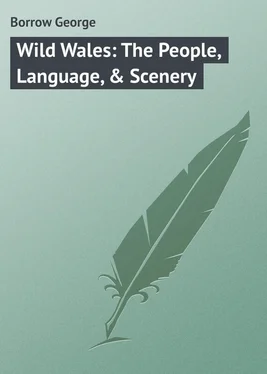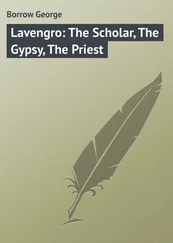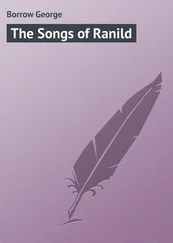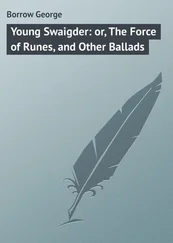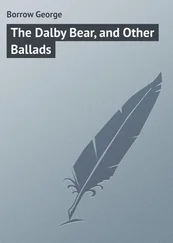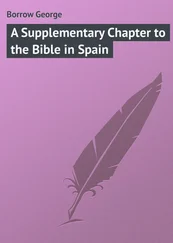George Borrow - Wild Wales - The People, Language, & Scenery
Здесь есть возможность читать онлайн «George Borrow - Wild Wales - The People, Language, & Scenery» — ознакомительный отрывок электронной книги совершенно бесплатно, а после прочтения отрывка купить полную версию. В некоторых случаях можно слушать аудио, скачать через торрент в формате fb2 и присутствует краткое содержание. Жанр: foreign_prose, Путешествия и география, на английском языке. Описание произведения, (предисловие) а так же отзывы посетителей доступны на портале библиотеки ЛибКат.
- Название:Wild Wales: The People, Language, & Scenery
- Автор:
- Жанр:
- Год:неизвестен
- ISBN:нет данных
- Рейтинг книги:5 / 5. Голосов: 1
-
Избранное:Добавить в избранное
- Отзывы:
-
Ваша оценка:
- 100
- 1
- 2
- 3
- 4
- 5
Wild Wales: The People, Language, & Scenery: краткое содержание, описание и аннотация
Предлагаем к чтению аннотацию, описание, краткое содержание или предисловие (зависит от того, что написал сам автор книги «Wild Wales: The People, Language, & Scenery»). Если вы не нашли необходимую информацию о книге — напишите в комментариях, мы постараемся отыскать её.
Wild Wales: The People, Language, & Scenery — читать онлайн ознакомительный отрывок
Ниже представлен текст книги, разбитый по страницам. Система сохранения места последней прочитанной страницы, позволяет с удобством читать онлайн бесплатно книгу «Wild Wales: The People, Language, & Scenery», без необходимости каждый раз заново искать на чём Вы остановились. Поставьте закладку, и сможете в любой момент перейти на страницу, на которой закончили чтение.
Интервал:
Закладка:
“No,” said she; “indeed I never heard of such a person.”
“He was the bard of Owen Glendower,” said I, “and assisted his cause wonderfully by the fiery odes, in which he incited the Welsh to rise against the English.”
“Indeed!” said she; “well, I am sorry to say that I never heard of him.”
“Are you Welsh?” said I.
“I am,” she replied.
“Did you ever hear of Thomas Edwards?”
“O, yes,” said she; “I have frequently heard of him.”
“How odd,” said I, “that the name of a great poet should be unknown in the very place where he is buried, whilst that of one certainly not his superior, should be well known in that same place, though he is not buried there.”
“Perhaps,” said she, “the reason is that the poet, whom you mentioned, wrote in the old measures and language which few people now understand, whilst Thomas Edwards wrote in common verse and in the language of the present day.”
“I dare say it is so,” said I.
From the church she led us to other parts of the ruin – at first she had spoken to us rather cross and loftily, but she now became kind and communicative. She said that she resided near the ruins, which she was permitted to show; that she lived alone, and wished to be alone – there was something singular about her, and I believe that she had a history of her own. After showing us the ruins she conducted us to a cottage in which she lived; it stood behind the ruins by a fishpond, in a beautiful and romantic place enough – she said that in the winter she went away, but to what place she did not say. She asked us whether we came walking, and on our telling her that we did, she said that she would point out to us a near way home. She then pointed to a path up a hill, telling us we must follow it. After making her a present we bade her farewell, and passing through a meadow crossed a brook by a rustic bridge, formed of the stem of a tree, and ascending the hill by a path which she had pointed out, we went through a corn field or two on its top, and at last found ourselves on the Llangollen road, after a most beautiful walk.
CHAPTER XIV
Expedition to Ruthyn – The Column – Slate Quarries – The Gwyddelod – Nocturnal Adventure.
Nothing worthy of commemoration took place during the two following days, save that myself and family took an evening walk on the Wednesday up the side of the Berwyn, for the purpose of botanizing, in which we were attended by John Jones. There, amongst other plants, we found a curious moss which our good friend said was called in Welsh Corn Carw, or deer’s horn, and which he said the deer were very fond of. On the Thursday he and I started on an expedition on foot to Ruthyn, distant about fourteen miles, proposing to return in the evening.
The town and castle of Ruthyn possessed great interest for me from being connected with the affairs of Owen Glendower. It was at Ruthyn that the first and not the least remarkable scene of the Welsh insurrection took place by Owen making his appearance at the fair held there in fourteen hundred, plundering the English who had come with their goods, slaying many of them, sacking the town and concluding his day’s work by firing it; and it was at the castle of Ruthyn that Lord Grey dwelt, a minion of Henry the Fourth and Glendower’s deadliest enemy, and who was the principal cause of the chieftain’s entering into rebellion, having in the hope of obtaining his estates in the vale of Clwyd poisoned the mind of Henry against him, who proclaimed him a traitor, before he had committed any act of treason, and confiscated his estates, bestowing that part of them upon his favourite, which the latter was desirous of obtaining.
We started on our expedition at about seven o’clock of a brilliant morning. We passed by the abbey and presently came to a small fountain with a little stone edifice, with a sharp top above it. “That is the holy well,” said my guide: “Llawer iawn o barch yn yr amser yr Pabyddion yr oedd i’r fynnon hwn – much respect in the times of the Papists there was to this fountain.”
“I heard of it,” said I, “and tasted of its water the other evening at the abbey.” Shortly after we saw a tall stone standing in a field on our right hand at about a hundred yards distance from the road. “That is the pillar of Eliseg, sir,” said my guide. “Let us go and see it,” said I. We soon reached the stone. It is a fine upright column about seven feet high, and stands on a quadrate base. “Sir,” said my guide, “a dead king lies buried beneath this stone. He was a mighty man of valour and founded the abbey. He was called Eliseg.” “Perhaps Ellis,” said I, “and if his name was Ellis his stone was very properly called Colofn Eliseg, in Saxon the Ellisian column.” The view from the column is very beautiful, below on the south-east is the venerable abbey, slumbering in its green meadow. Beyond it runs a stream, descending from the top of a glen, at the bottom of which the old pile is situated; beyond the stream is a lofty hill. The glen on the north is bounded by a noble mountain, covered with wood. Struck with its beauty I inquired its name. “Moel Eglwysig, sir,” said my guide. “The Moel of the Church,” said I. “That is hardly a good name for it, for the hill is not bald (moel).” “True, sir,” said John Jones. “At present its name is good for nothing, but estalom (of old) before the hill was planted with trees its name was good enough. Our fathers were not fools when they named their hills.” “I dare say not,” said I, “nor in many other things which they did, for which we laugh at them, because we do not know the reasons they had for doing them.” We regained the road; the road tended to the north up a steep ascent. I asked John Jones the name of a beautiful village, which lay far away on our right, over the glen, and near its top. “Pentref y dwr, sir” (the village of the water). It is called the village of the water, because the river below comes down through part of it. I next asked the name of the hill up which we were going, and he told me Allt Bwlch; that is, the high place of the hollow road.
This bwlch, or hollow way, was a regular pass, which put me wonderfully in mind of the passes of Spain. It took us a long time to get to the top. After resting a minute on the summit we began to descend. My guide pointed out to me some slate-works, at some distance on our left. “There is a great deal of work going on there, sir,” said he: “all the slates that you see descending the canal at Llangollen come from there.” The next moment we heard a blast, and then a thundering sound: “Llais craig yn syrthiaw; the voice of the rock in falling, sir,” said John Jones; “blasting is dangerous and awful work.” We reached the bottom of the descent, and proceeded for two or three miles up and down a rough and narrow road; I then turned round and looked at the hills which we had passed over. They looked bulky and huge.
We continued our way, and presently saw marks of a fire in some grass by the side of the road. “Have the Gipsiaid been there?” said I to my guide.
“Hardly, sir; I should rather think that the Gwyddeliad (Irish) have been camping there lately.”
“The Gwyddeliad?”
“Yes, sir, the vagabond Gwyddeliad, who at present infest these parts much, and do much more harm than the Gipsiaid ever did.”
“What do you mean by the Gipsiaid?”
“Dark, handsome people, sir, who occasionally used to come about in vans and carts, the men buying and selling horses, and sometimes tinkering, whilst the women told fortunes.”
“And they have ceased to come about?”
“Nearly so, sir; I believe they have been frightened away by the Gwyddelod.”
“What kind of people are these Gwyddelod?”
Читать дальшеИнтервал:
Закладка:
Похожие книги на «Wild Wales: The People, Language, & Scenery»
Представляем Вашему вниманию похожие книги на «Wild Wales: The People, Language, & Scenery» списком для выбора. Мы отобрали схожую по названию и смыслу литературу в надежде предоставить читателям больше вариантов отыскать новые, интересные, ещё непрочитанные произведения.
Обсуждение, отзывы о книге «Wild Wales: The People, Language, & Scenery» и просто собственные мнения читателей. Оставьте ваши комментарии, напишите, что Вы думаете о произведении, его смысле или главных героях. Укажите что конкретно понравилось, а что нет, и почему Вы так считаете.
